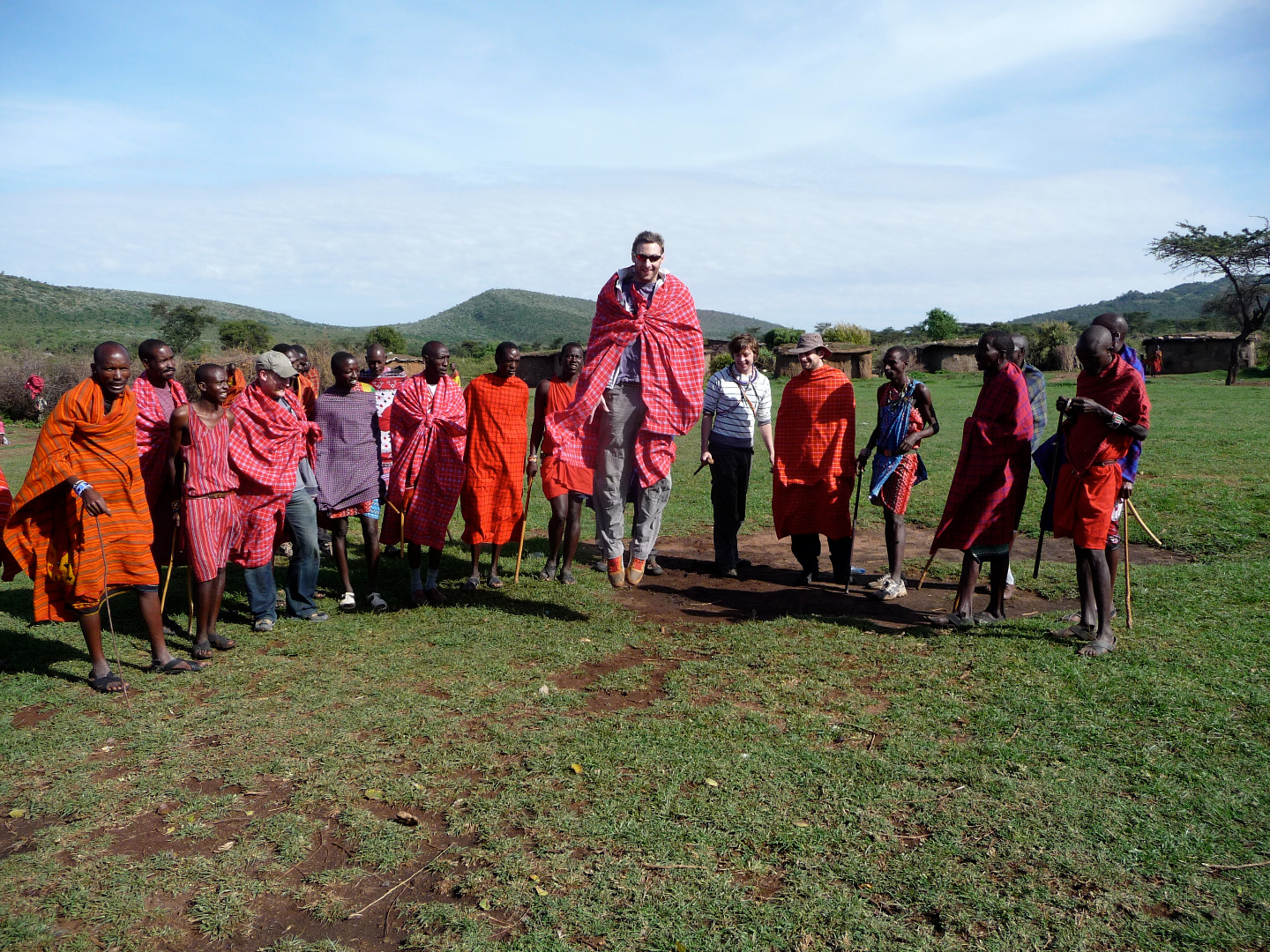
Kenya Cultural Tips
Kenya is a welcoming place filled with vibrant culture. Kenyans are lighthearted and casual. Laughter is around every corner. Connect better with locals using these cultural tips.
HOW DO YOU SAY HELLO IN KENYA?
A handshake is the most common form of greeting. It is more polite and a sign of respect if you make the handshake firm. “Jambo?” or “Habari” (“How are you?) is usually said immediately prior to a handshake. After a handshake, it is common to have some form of small talk where general questions about the other person are asked such as ‘How is your work?’ ‘How is your home?’ ‘How is your family?’ and is often injected with good doses of humour and laughter, in non-confrontational and polite manner. Do not be surprised to see people take time out and at work to talk and catch up, as if time was timeless in itself.
Handshakes are required, regardless of how many people you are greeting. For example, if you enter a room with 30 people gathered for a meeting, it is usually expected that you will take the time to greet each individual with a handshake. Always greet the oldest person first, and then proceed to the rest of the people finishing with the youngest, children. To skip or rush this element in the greeting process is the height of poor manners.
If you are greeting someone whose hands are not clean they might politely choose to extend their arm and expect you to greet/grasp their arm at elbow level instead, rather than their hand.
People are generally addressed by their academic, professional or honorific title followed by their surname. If the person is unknown to you, then to call them by their most distinguished title is appropriate – Mr., Mrs., Dr., etc.
Kenyans may also be addressed as mother of so and so, or father of so and so. For instance, the mother and father of Mary may be referred to as ‘Mama Mary’ and Baba Mary’. Referring to your friends’ parents in such a manner is also respectful.
COMMUNICATION STYLE
Communication style in Kenya is not normally frank and direct. Many Kenyans use indirect ways of communication in order to make a point in an attempt not to cause problems. Blunt statements are not normally used. It is up to you to read between the lines and decipher what may really being said. With this in mind, criticism should be delivered in private and given in a circumspect manner.
WHAT IS PERSONAL SPACE LIKE IN KENYA?
Conversation generally takes place at arm’s length after shaking hands. However, it is common to see men who know each other well, walking and talking whilst remaining hand in hand. This is accepted and in no way seen as strange behaviour. It is less common to see men and women/couples hand in hand or displaying any affection in public. Kenya is an extremely open and friendly society, so if you know someone well, touching a shoulder or arm in conversation is common, as is plenty of laughter.
HOW DO KENYANS VIEW TIME?
‘Kenyan Time’ is known to be flexible in that services may be delayed and time may not always be kept. However, one is expected to turn up for meetings on time, and an apology and explanation is expected. Heavy rain can slow things down to a standstill, such as public transportation, consequently traffic. For Kenyans, ‘Kenyan time’ is generally taken this in good faith, accepting delays as just part of life and beyond their control.
ARE THERE ANY GENDER ISSUES IN KENYA?
Women are generally expected to do the majority of the work in the home, especially in rural areas –farming, cooking, cleaning, shopping, and caring for the children. In rural areas, women usually do not wear trousers and are not expected to smoke and drink in public. However, in Nairobi and other cities, gender roles and values are very much in line with Western cultures, where wearing trousers, drinking and smoking are common among females is common across the genders. Things are changing as society modernizes.
WHAT LANGUAGE DO PEOPLE SPEAK IN KENYA?
Whilst Swahili (or Kiswahili) is the national language of Kenya, English widely spoken as the formal and international language. However, as you move into the rural areas, the common language is Swahili or the mother tongue – tribe common in the area. Each province has a tribe or tribes that is common to the area. Swahili is however common to all Kenyans and English is commonly spoken in the cities and urban areas.
Sheng is a commonly spoken slang in Kenya’s capital, and other urban cities in the country. It is a mixture of Swahili and English, with a sprinkling of other indigenous languages. In fact, Sheng is more than just slang – it’s a lifestyle, especially among the urban youth who, today, are more fluent in Sheng than in the purer forms of Kiswahili.
WHAT IS THE FOOD LIKE IN KENYA?
With all situations that involve food you must always keep in mind that you are in a part of the world where attitudes to food can be drastically different to those in your home country. In the West, we may be used to the concept of food as being taken for granted and even indeed viewed as something of a “leisure pursuit” where we may expect a wide variety of choice where we “take what we fancy” or eat mainly for fun. In large parts of the developing world, the primary focus of many people’s difficult working life may be purely to provide sufficient food, of any kind, to keep them and their family alive. In this context, you will understand that it will be grossly inappropriate and unacceptable for you to waste food or to refuse or complain about it just because it is not exactly what you want.
Kenyan cuisine is rich in ethnic diversity. Popular staple foods include Ugali, rice, bread, chapatti beef, chicken, goat, tilapia and an assortment of fresh vegetables and fruits. In times of celebration and on special occasions such as Christmas and wedding ceremonies, it is customary for Kenyans to kill and roast a goat, cow or chicken.
Tea is a common beverage in Kenya and regularly taken especially at 10am and 4pm. In most homes, it is taken also after the evening meal. The tea is normally sweet and milky.
When invited for a meal, you should accept the meal that is offered to show that you accept their hospitality. The best course of action is to behave formally. When in doubt, watch what others are doing and follow their lead. It is considered polite to finish everything on your plate, although it is not mandatory.
WHAT ARE THE FAMILY ROLES IN KENYA?
Kenyans also place great importance on family. They place great emphasis and honour collective responsibilities and traditional values, which include treating the elderly with respect and reverence. Quite often it is common for people to live with their relatives and share their belongings. Many families also live with and care for their aged parents.
As you might expect in a group-orientated culture, the upbringing of a child is the responsibility of the entire family and the extended family as well. This could be in assisting the child education wise, marriage wise and with and many other needs that rise within a family setting. In more rural settings, a child may not only be punished by his parents if disobedient, but the elderly in society or relatives can also ‘discipline’ the child.
Neighbourliness is common, and the neighbours are often spend time in each other’s homes. A neighbour may also borrow certain things such as sugar, matchsticks or anything that they may need urgently, and are not able to get immediately.
CAN YOU BARGAIN IN KENYA?
Bargaining in Kenya when trading is always carried out in good humour, and is less an art than a necessity. Open markets are common places where bargaining is common. The seller will give you the highest price and you are expected to bargain, which may take a long time, depending on the price that you are expecting. Business is business, and when the final price is reached, Kenyans will forget all ill will. It just takes persistence and a sense of humour. Negotiating is not common in the up market in-door shops and stores in the city.
Hawking is also common in the streets and even sometimes in public means of transport such as buses. You may feel free to buy what you fancy from them. However, if inundated by hawkers and you are not interested a polite ‘No thank you’ or ‘Kesho’ (maybe tomorrow) is often the most effective way of dealing with the situation.
HOW DO KENYANS SOCIALIZE?
Kenyans love to party and bars, nightclubs, music concerts and discos are popular hangouts for Kenyans where dancing is common. Kenyans love their beer (Tusker) almost as much as their dancing and there’s a thriving local brewing industry.
Kenyans are also football fanatics and are up to date with soccer news worldwide. You will be in very good company and easily blend in with the crowd of young men, if you are also well versed with the latest football occurrences. Politics is also a common household topic depending on the current political scene.
In this people oriented society, Kenyans love to visit each other in general and visiting a friend or relative does not require any prior plans or schedules. It is common for people to visit each other impromptu and normally a refreshment (cup of tea and snack) is offered or a meal depending on the time of day.
LAW AND ORDER IN KENYA
The Kenyan legal system, regards the adult age as 18, making the drinking age 18. There are hundreds of petty offenses, such as talking on a mobile phone whilst driving, not using seatbelts while on the road. Fines are charged for such offense of which the real penalty you will pay for this is your time. This is because you will spend a long time in court and pay a very small fine – the real penalty is the time-wasting element in court.
Stealing is heavily enforced through ‘mob justice’, especially in rural areas. Anyone even suspected or accused of stealing – even a cell phone – is likely to be severely beaten, at times to death, by a nearby crowd.
HOW DO PEOPLE DRESS IN KENYA?
Kenyans tend to dress in a conservative manner with an emphasis on appearing smart and well dressed as a matter of pride. To look sloppy or wear revealing or damaged clothes would mean that a foreigner would instantly lose a degree of respect amongst Kenyans.
For general guidance you should keep your upper arms to the elbow and upper legs to the knee covered. In addition, tops should not finish above the waistline of your trousers and expose your midriff and your neckline should not extend down more than a few inches.
WHAT IS THE RELIGION IN KENYA?
More than half the population in Kenya constitutes of Christians, 10% Muslims, and 10% Indigenous beliefs. Whilst a majority of the Kenyans are followers of the Christian faith, Islam is the main religion for those communities living along the cost and Somali community. The Asian community is mainly Hindu, while others observe the traditional methods of worship.
Religion is important in Kenya culture. Gospel music is popular and especially in cities you’ll often see street preachers, who offer religion as a solution of the many social ills in Kenya.
WHAT IS THE KENYAN LIFESTYLE LIKE?
Within Africa, Kenyans enjoy a reputation as hard workers and at 7 o’clock the streets are crowded. However, Kenyans take it easy and have a casual approach “Hakuna Matata” to time which is common especially at the coast.
Kenyans like to laugh and quickly offer a smile to people. The British influence is still visible in their politeness, and also in the outer appearance of streets and buildings, signs etc. which look a bit like Britain in the 1960s. A Kenyan will take the time for you if you ask him something.
If there is just anything unusual, a crowd will assemble within a minute around you and everybody will offer his opinion on what’s going on. Even foreigners are quickly invited to participate in whatever’s going on.
Kenyans often use proverbs and sayings to comment on things. They are typically comparisons drawn from everyday life, and show some very down to earth, good humoured wisdom.
GIFT GIVING ETIQUETTE IN KENYA
Gift giving is not a common practice in Kenya, it is reserved for events of significance in a person’s life or a religious significance. Here are a few gift giving tips:
- Gifts shouldn’t be fancy. Practical gifts are best.
- It is customary to give small gifts to servants, trades people and service workers around Christmas.
- If you are invited to a meal at home, bring pastries, flowers or sweets. Sugar and tea are common in rural are
- Do not give alcohol.
- Gifts should be wrapped nicely.
- Give gifts using the right hand only or both hands, avoid using the left hand.
ENVIRONMENTAL AND SOCIAL ISSUES IN KENYA
Kenya, like most nations, struggles with several environmental issues. The major issues in Kenya are deforestation, desertification, water shortages, poaching, pollution and degraded water quality. As a visitor to this beautiful land, it is important to remember to minimize our impact on the environment. Always pack out trash, and avoid using disposable plastic water bottles. Bring a filter, a SteriPen or iodine tablets to treat water prior to drinking. We advise you to bring two methods, should one fail you. Bring a reusable shopping bag with you if you plan on doing any shopping, this stops the use of plastic bags while in country. Every little bit helps to minimize impact on the environment.
Kenya’s widespread poverty has led many to turn towards poaching. Poaching is highly illegal in Kenya and care should be taken when purchasing any animal products. It is best to avoid such purchases while in country.
KENYA FESTIVALS AND HOLIDAYS
Kenya celebrates several holidays and festivals throughout the year. Celebrations almost always include music and dance. These events celebrate community and family, if you are around during these times, expect to be a part of the celebration. With a predominantly Christian culture, Easter and Christmas are widely celebrated throughout the country. Eid al-Fitr, the end of Ramadan is also celebrated. Keep in mind that Ramadan happens at different times each year.
OTHER FESTIVALS AND HOLIDAYS INCLUDE:
East African Arts Festival: Nairobi hosts an amazing three-day event celebrating East African Arts. Happens in March.
International Camel Derby and Festival: Celebrated in the northern town of Maralal. Several days of camel races, cycle races, donkey rides, and the opportunity to rent a camel for the day. Happens in August.
Mombasa Carnival: Artists, dancers, musicians and tribes people alike flock to Mombasa to take part in concerts and a parade. Happens in November.
Jamhuri Day: December 12th marks the day that Kenya celebrates being a republic or “jamhuri.” In true Kenyan fashion there is dancing, parades, and speeches by each of the Provincial Presidents. Fireworks and airshows are a new addition to the festivities.
TIPPING
Tipping in Kenya varies based on the service you receive. Tip around 10% in restaurants and a couple hundred shillings in hotels for cleaning staff and porters. For the people cleaning your room, leave a tip at the beginning of your stay to show your appreciation. 200-500 shillings is appropriate. If you’re taking a taxi, there is no need to tip, although rounding your fare up to the nearest 100 shillings is appreciated.
Tips for guides are also customary. How much to tip is entirely up to you. For more information regarding Adventure Alternative and our tipping recommendations see our Tipping Page.
Book Your Adventure of a Lifetime Now
Discover our trips to other Countries
Adventure Alternative Articles

12 MONTHS, 12 MOUNTAINS
Climbing Calendar Ready for World Mountain Day In celebration of World Mountain Day, we've created a calendar for the year to make it easy for...

Mount Aconcagua Trip Review
January 2016 This year we had a team of twelve clients from four different countries – Iran, Ireland, England, South Africa and Argentina –...

Alcey’s Survival Skills Course at Lupa Masa Jungle Camp
SURVIVAL SKILLS COURSE AT LUPA MASA JUNGLE CAMP | ADVENTURE ALTERNATIVE In celebration of International Rural Women’s Day, we’re talking...